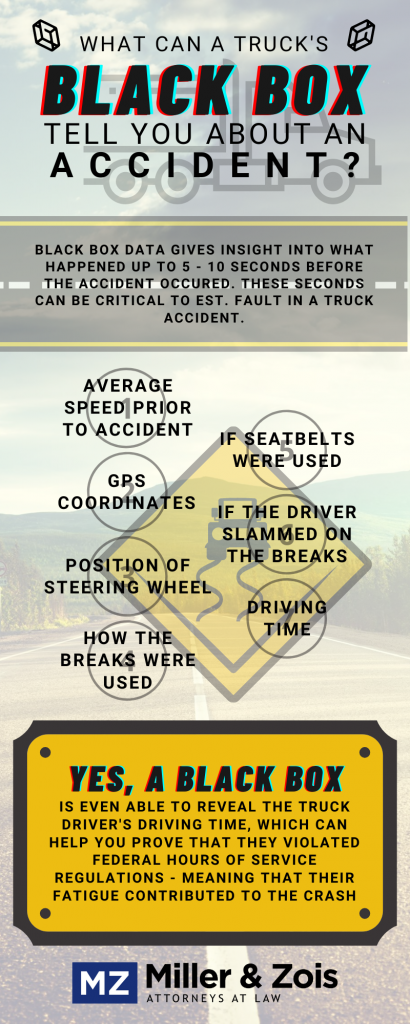If you are a truck accident attorney for victims, you have to know how you will deal with the truck’s black box after a crash. It can make a difference between winning and losing the case.

What Is a Black Box?
Trucking companies often equip their vehicles with a “black box” that records vehicle data, such as speed, location, and movement.
In 2020, a black box is really not a black box. It is "electronic control modules" (ECMs) or "event data recorders" (EDRs) that tracks all of this information with a computer.
Trucking companies do this to promote efficiency in terms of scheduling, cargo tracking, route determinations, and other efficiencies. Companies monitor their drivers, too, to make sure they are where they are supposed to be, doing what they are supposed to be doing, while they are out on the road.
Preservation of electronic data from any of these sources is vital to the defense of litigation arising from an accident, as it may be the most reliable and objective source of information about the events that occurred just prior to a crash.
Why Does an Experienced Truck Accident Lawyer Matter?
Many lawyers think a trucking accident case is just a car accident case on steroids. As I have written about on this blog, it is not. The intricacies of dealing with a black box is just one example of many. Experienced Maryland truck accident lawyers know to ask for things like vehicle data recorder information in discovery requests.
Downloading the Black Box Data
I’m pretty amazed at the liberties trucking companies will take with evidence even then they know everyone is watching. One thing you have to be careful about is the defense lawyer hiring experts and extracting the “black box” data without Plaintiff’s lawyers or experts. Downloading this data is tricky and the chain of custody of the data is critical. You don’t want to rely on the defense expert, or worse, the trucking company, taking off the data. It will create uncertainty about tampering and may make the judge question the accuracy or authenticity of the data. in
Truck Accident Defense Lawyers Want to Win, Too
Most truck accident cases in Maryland are defended by less than a handful of law firms. They want to win, too, and they know how to defend truck accident cases. Almost all these truck accident lawyers who defend these companies took the same course on how to be an obstructionist. Here is an example answer to our request for black box information:
OBJECTION. This Request is overly broad, unduly burdensome and seeks to discover information not reasonably calculated to lead to the discovery of admissible evidence.
This kind of insanity is not uncommon with truck accident defense lawyers. Of course, information about speed, stopping, vehicle load, and driving time is relevant to figuring out if a truck driver was negligent? This response is about as ridiculous as arguing that a videotape of the accident is irrelevant.
What this response really means is “you are only getting this if you make me.” The root cause of this phenomenon is plaintiffs’ lawyers who will not take the time to get this information the hard way. Obstructionist defense lawyers get away with this all the time because the plaintiff’s lawyer doesn’t read the discovery responses closely or at all until 2 weeks before trial. There is a reason why this annoying tactic is used: it works too often.
Not Just Trucks Have Black Boxes in 2020
Many cars today have computer systems such as OnStar, Engadget, SmartDrive, Webtec, that do much of what a black box in a truck does. It is not exactly the same. These devices typically start recording in the event of a crash and only records data, like airbag deployment. But they can help put the pieces of an accident together.
Today, all sorts of records matter. Your cell phone may have data. So might your Whoop or FitBit. As lawyers, we have to figure out what evidence is available to marshal as much evidence as we possible can to prove your case.
 Baltimore Injury Lawyer Blog
Baltimore Injury Lawyer Blog

